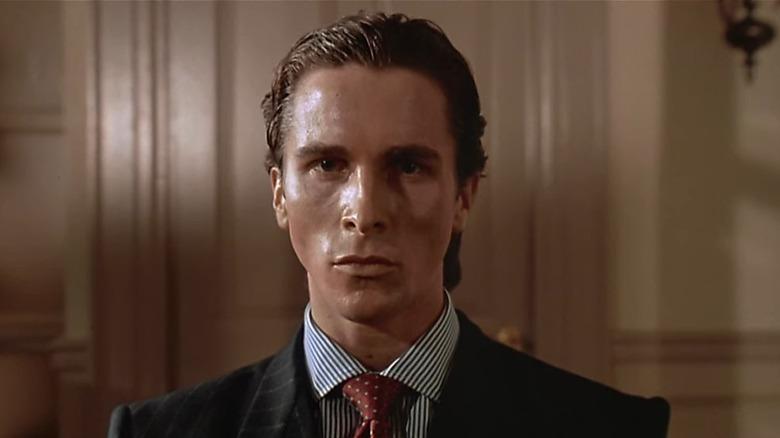Netflix's Hit Man Has A Hilarious (And Telling) American Psycho Reference
This article contains spoilers for "Hit Man."
Netflix acquired Richard Linklater's comedy "Hit Man" out of its screening at the 2023 Toronto International Film Festival and the choice seems to have paid off for them. /Film has been a little more down on the movie than most (read our review here), but "Hit Man" soon hit #1 on Netflix's streaming charts after its June 7 debut on the platform. The streamer is probably feeling pretty good now after many other studios passed up the chance to shepherd "Hit Man" to completion.
"Hit Man" is loosely based on a true story, first told in a 2001 Texas Monthly article written by Skip Hollandsworth about Gary Johnson, a Houston community college professor who had a movie-worthy side-gig; he played the part of a professional assassin during police sting operations. "Hit Man" (which moves its story to Louisiana) stars Glen Powell as Gary, portrayed as a milquetoast man who only comes alive with confidence when he's pretending to be a criminal. The story diverges into fiction when he meets a prospective "client" Madison (Adria Arjona) — who wants her abusive husband dead — and falls for her.
The film often uses montages to pack Gary's many different stings into just a few moments. He plays a different kind of hit man for each and every "client," as he feels different people will have different images in their heads of what a hit man looks like. When meeting a "future school shooter" who wants his mom dead, he's a scarred, leather jacket-wearing badass who talks like Batman.
The Christian Bale impressions don't end there; one of Gary's hitman personas is a recreation of Patrick Bateman, the serial-killing investment banker who Bale played in "American Psycho." Powell's Bateman has the same slicked-back hair, red tie & suit combo, and nasally-yuppie voice that defined Bale's performance.
Both Hit Man and American Psycho are about performance
"American Psycho" is about an evil man with contempt for the world who nonetheless wants to be part of it and all its shallow materialism. Bateman grooms himself obsessively, chases all the trends his coworkers do, and listens to the most anodyne music he can. When his fiance Evelyn (Reese Witherspoon) asks why he doesn't quit the job he hates, he answers "Because I want to fit in!"
"Hit Man" is about a man who fits in so well that no one notices him. Patrick Bateman is a psycho who tries and fails to be normal while Gary Johnson is a normal man who plays a psycho — sometimes an American one. It's a telling comparison not just because "Hit Man" invokes "American Psycho," but because the movie is really about acting.
Gary spends most of the movie pretending to be someone else — like Powell is doing to play him. He researches his "roles" (by stalking his targets' social media) and wears a unique costume each time. After Madison murders her husband, Gary (as her hitman boyfriend Ron) "directs" a scene of the two of them arguing, giving her instructions via text on his phone because he's aware his police colleagues are listening in on a wire. Gary and Madison know they have to convince their audience in the same way Linklater, Powell, and Arjona do theirs.
Much of the positive buzz about "Hit Man" has been about Glen Powell proving he's a movie star — no surprise because the movie wants you to notice his acting chops. (Powell co-wrote the "Hit Man" script with Linklater.) As Britt Hayes notes in her excellent essay on "Hit Man" at The Mary Sue, "Hit Man" often feels like a reel for Powell, trying to win over audiences with the proof that he has range on top of his charisma and handsome face. What "American Psycho" did for Christian Bale's reputation, Powell wants "Hit Man" to do for him.
Hit Man's satisfying yet sinister ending, explained
Acting, "Hit Man" argues, can change someone into being the character they play. Where this hits a potential bump is the ending. Police officer Jasper (Austin Amelio) discovers the truth about Gary and Madison and tries to blackmail them. So, they kill him; Madison slips poison in his drink and Gary ties a plastic bag over his head to suffocate him. Cut to years later when the two are happily married with kids. Gary delivers a semester (and movie) summating monologue to his students about how our personalities aren't immutable like he once thought it was.
There's a sinister subtext to this happy ending though, one I'm not quite convinced the movie reckons with. Gary claims he "eventually found the proper cocktail of Gary and Ron." Personal growth is often good — but Gary's self-actualization was completed with murder.
Now, "Hit Man" does use some of its closing moments to show this happy ending is blood-stained. When Madison hears some hyperbole about wanting to strangle someone to death, the camera pushes in and lingers on her awkward laugh while her eyes betray buried memories of Jasper's death. When Gary and Madison's daughter asks how they met, the two speak vaguely — they'll be dodging questions like that for the rest of their lives. They know what they did was wrong but they got away with it and Jasper was an a-hole, so why worry? This winds up feeling like the film's stance too.
I don't think movies need to be didactic and instruct their audiences on right and wrong, but "Hit Man" does precisely that when Gary tells his students (and audience) to "seize the identity you want for yourself." Is that still good advice when it turned the man speaking it into a killer? I think this is the one circle "Hit Man" doesn't square; by staying a crowd-pleaser to the end, it actually winds up with a messier conclusion.
"Hit Man" is streaming on Netflix.


